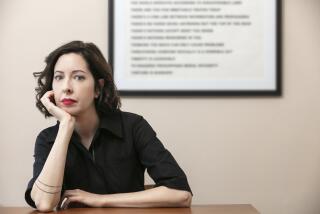Author explored gay, lesbian relationships
- Share via
Jane Rule, a leading Canadian writer who championed gay and lesbian concerns in her essays, novels and short stories, died Nov. 27 of cancer at her home on Galiano Island, British Columbia. She was 76.
Rule was best known for her first novel, “Desert of the Heart” (1964), which explored the lives of two women who risk living together in a romantic relationship. It provided the inspiration for the 1985 movie “Desert Hearts” by director Donna Deitch.
She fought government censorship of gay and lesbian writing and became the most prominent lesbian in Canada, a role she said she did not welcome but eventually accepted in order to educate the public about who lesbians are.
“As a lesbian, I believe it is important to stand up and be counted,” she once wrote, “to insist on my dignity and joy loving another woman.”
Critics praised her clear-eyed writing about unconventional relationships. “Rule regards homosexuality as no more or less than one of the ways human beings express their love,” Linda Cahill wrote in a 1985 review in the Globe and Mail of Rule’s 10th book, “Inland Passage and Other Stories.”
Margaret Atwood, the Canadian novelist, critic and feminist, who met Rule in the 1960s, said that Rule’s novels were “never tracts,” even though they endorsed intimate relationships between women. “What interested her was character, in all its forms . . . the richness and unpredictability of life,” Atwood told the Globe and Mail last week.
Among Rule’s other works were the novels “This Is Not for You” (1970), “Against the Season” (1971), “Memory Board” (1987) and “After the Fire” (1989). Many of her essays and short stories were collected in several books, including “Theme for Diverse Instruments” (1975), “Lesbian Images” (1975) and “A Hot-Eyed Moderate” (1985).
Rule was born in Plainfield, N.J., in 1931 and grew up in the Midwest and in California. She graduated from Mills College in 1952 with a degree in English and studied in London for a year. She was briefly enrolled in a writing program at Stanford University but abandoned it because she found it too commercial.
While teaching at Concord Academy in Massachusetts, she met her life partner, Helen Sonthoff, and moved to Vancouver in 1956, in part out of disgust with McCarthy-era politics and the oppression of homosexuals. She became a Canadian citizen in the 1960s. In February, she was named a member of the Order of Canada, the country’s highest civilian honor.
More to Read
Sign up for our Book Club newsletter
Get the latest news, events and more from the Los Angeles Times Book Club, and help us get L.A. reading and talking.
You may occasionally receive promotional content from the Los Angeles Times.









